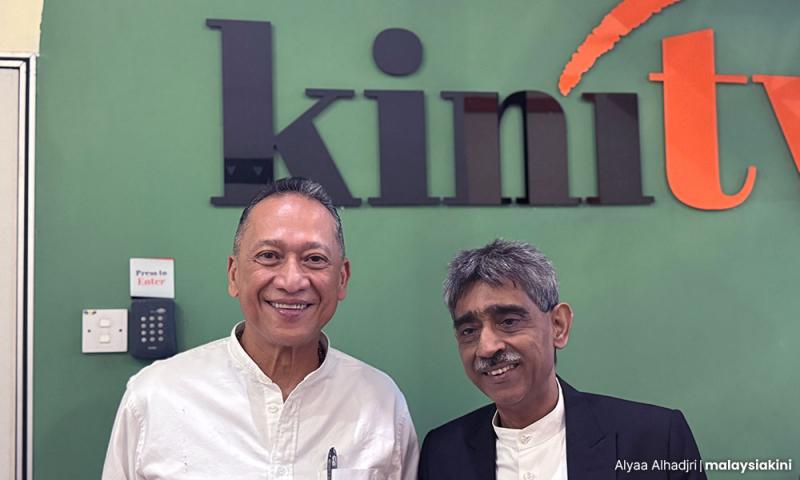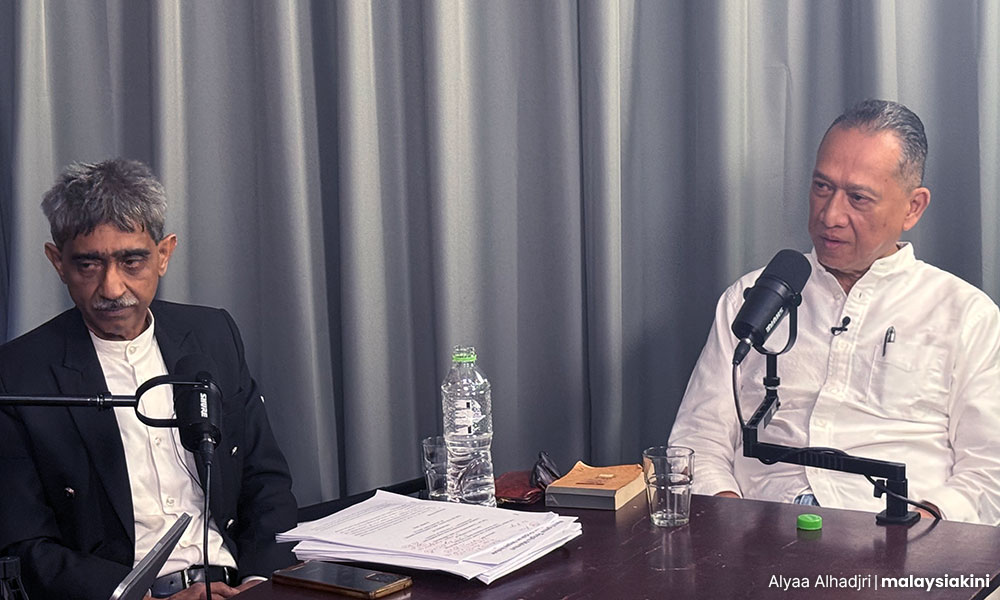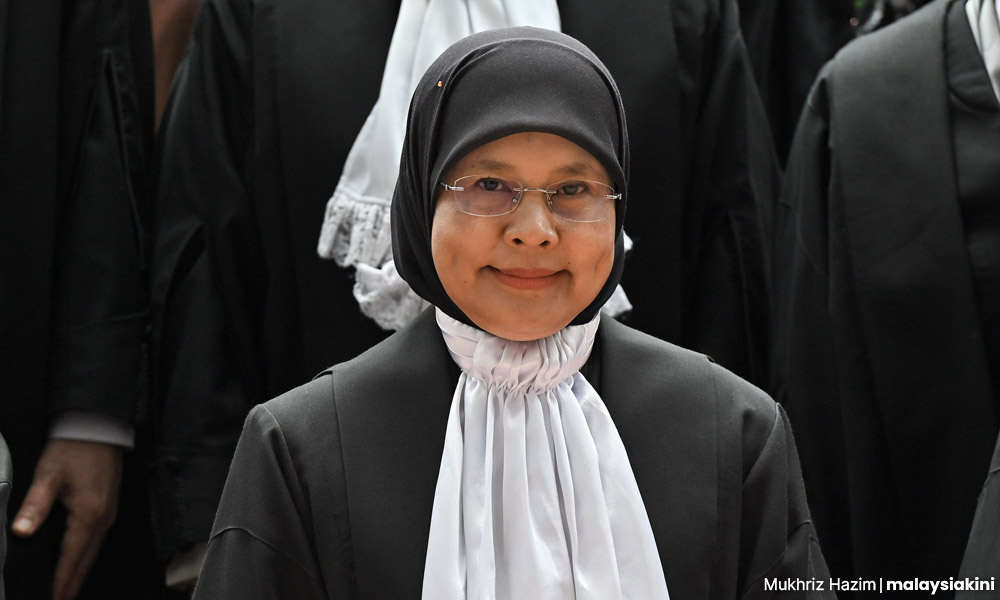


Dr M's lawyer defends Anwar and CJ, moots RCI on judicial reform
Alyaa Alhadjri
Published: Apr 18, 2025 5:49 PM
Updated: 7:49 PM
Summary
- Senior lawyer Haniff Khatri Abdulla called for Sections 5, 26, and 27 of the Judicial Appointments Commission Act 2009 to be amended to reduce the prime minister’s influence in appointing judges.
- He defends Chief Justice Tengku Maimun Tuan Mat and Prime Minister Anwar Ibrahim against claims of interference, saying the CJ’s remarks on reform were general and not targeted at the current leadership.
- The lawyer to former prime minister Dr Mahathir Mohamad also proposed an RCI to deliberate on judicial reform, including the separation of powers between the attorney-general and public prosecutor.
A senior lawyer argued that the government’s reform efforts should include amending the Judicial Appointments Commission Act 2009 to limit the prime minister’s powers in appointing judges.
Haniff Khatri Abdulla, as a guest on KiniTV’s Bahasa Malaysia podcast, said the amendments could be made to three specific sections of the Act - Section 5, 26, and 27.
“On the proposal for an outgoing chief justice to suggest a name to be their successor, I think that is not quite accurate.
“Because of the issue of neutrality. How do we ensure the outgoing chief justice does not go against the concept of ‘neutrality’ by selecting their favoured candidate?” he said.
Haniff (above, right), known as a lawyer to former prime minister Dr Mahathir Mohamad, said this in defending Chief Justice Tengku Maimun Tuan Mat and Prime Minister Anwar Ibrahim against speculations of executive interference in the judges’ appointment process.
Also featured on the podcast was former Malaysian ambassador to the US, Nazri Abdul Aziz.
Nazri, who is a former law minister, previously questioned the timing of Tengku Maimun’s remarks during a recent speech in Malta, where she reportedly urged the removal of the prime minister’s role in judicial appointments as it “would reinforce the impartiality of the selection process” and ensure it “remains free from any perception of political influence.”
On the podcast, Nazri reiterated that it was “improper” for Tengku Maimun to do so with no “evidence” of the alleged interference.

Contrary to criticisms against Tengku Maimun’s remarks, Haniff said he found she did not make any direct reference to alleged interference by Anwar, and instead, the questions raised had long been discussed as part of needed judicial reforms.
Elaborating, Haniff said the Judicial Appointments Commission (JAC) was established in 2009 to reform the appointment process, but issues remain under Section 5, which sets out the composition of its nine members.
“How do we make sure the JAC is neutral, instead of the majority being appointed by the prime minister? That is the main issue,” he said.
The JAC, chaired by the Chief Justice, also comprises the Court of Appeal president; Chief Judge of the High Court in Malaya; Chief Judge of the High Court in Sabah and Sarawak; a Federal Court judge to be appointed by the prime minister; and four eminent persons appointed by the prime minister based on consultations with stakeholders.
“Secondly, Section 26 states that if the JAC’s recommendations do not attract the prime minister’s attention, the prime minister can ask for two more names (of eminent persons).
“Thirdly, Section 27 states that if the prime minister has decided to submit the proposed names to the Yang di-Pertuan Agong, then the prime minister can proceed to do so,” he said.
“When read together, Section 5, Section 26 and Section 27 mean that the prime minister can at any time, and I’m not just talking about the current prime minister, reject the JAC’s recommendations.
“So that is the issue today,” he stressed.
In Malaysia, judicial appointments are made by the Yang di-Pertuan Agong on the advice of the prime minister.
RCI on judicial reform
Moving forward, Haniff mooted the formation of a Royal Commission of Inquiry (RCI) to deliberate all proposed judicial reforms, including the separation of powers between the attorney-general and the public prosecutor.
“How can the Attorney-General’s Chambers draft a law to separate the powers from their office? That is a conflict of interest.
“By right, such matters should be carried out by an institution of the Constitution,” he argued.
“The same with the JAC, which should have been an institution of the Constitution. These fall under the Yang di-Pertuan Agong,” said Haniff.

Chief Justice Tengku Maimun Tuan Mat
He added that the RCI should be given a time frame to come up with its recommendations that will be tabled in Parliament for further action.
In the conversation with Haniff, Nazri maintained he held a differing opinion, that Tunku Maimun in her speech touched on proposed law amendments which fall under the purview of the legislative.
“If a chief justice talks about amending the Constitution to remove powers of the prime minister, that already touches on the work of Parliament.
“We should show respect. Don’t just ask to be respected,” said the former six-term Padang Rengas MP who remains as the division’s Umno chief.
Others who defended Tunku Maimun from Nazri’s criticisms included another former law minister, Zaid Ibrahim, and former deputy law minister, Bukit Gelugor MP Ramkarpal Singh.
In the conversation with Haniff, Nazri maintained he held a differing opinion, that Tunku Maimun in her speech touched on proposed law amendments which fall under the purview of the legislative.
“If a chief justice talks about amending the Constitution to remove powers of the prime minister, that already touches on the work of Parliament.
“We should show respect. Don’t just ask to be respected,” said the former six-term Padang Rengas MP who remains as the division’s Umno chief.
Others who defended Tunku Maimun from Nazri’s criticisms included another former law minister, Zaid Ibrahim, and former deputy law minister, Bukit Gelugor MP Ramkarpal Singh.